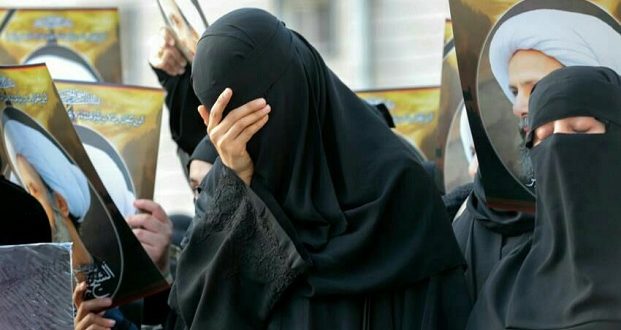
The Saudi authorities have used a counter-terror law and the Specialized Criminal Court (SCC) to unfairly sentence rights defender, Naimah Abdullah Almatrod, to a six-year prison term followed by a six-year travel ban for her peaceful role in defending human rights in Saudi Arabia.
Naimah Almatrod, 43, is a prominent human rights defender, who had spent the past five years bravely defending the rights of those who suffered abuse by the authorities in the aftermath of the 2011 protests in Saudi Arabia. In this period, Naimah Almatrod continued to exercise and promote the rights to peaceful assembly, association and expression in Saudi Arabia by participating in peaceful pro-democracy demonstrations which called for civil and political rights and the release of unjustly imprisoned detainees, and by monitoring and documenting violations against protestors, human rights defenders and detainees, and by blogging on social networks.
Despite being all too aware of the risks she faced, Naimah Almatrod criticized the Saudi authorities’ violent suppression of the peaceful protest movement in Saudi Arabia, and its support of other Arab countries, such as Bahrain, in their efforts to crush peaceful dissent and calls for democracy and freedoms by their citizens during the “Arab Spring”.
The Saudi authorities had previously arrested Naimah Almatrod on more than once occasion. In February 2016, she was arrested for a period of two days whilst on her way home from work. Two months later, in April 2016, Naimah’s brother received a phone call informing him that his sister was subject to a summons by the General Directorate of Investigations (GDI) in Anak city, in the Qatif governorate. Although the authorities stated they were summoning Naimah for a routine interrogation, they kept her indefinitely detained after holding her incommunicado for the first two weeks following her arrest.
For over a year, the Saudi authorities violated the Saudi Law of Criminal Procedures by denying Naimah Almatrod the right to a lawyer or a legal representative during her interrogations. Following her immediate arrest and detention, Naimah was held incommunicado and her family was only given visitation rights two weeks later. In subsequent visits, it has been reported that Naimah’s health had significantly deteriorated because of anaemia, a pre-existing medical condition that she suffered from, which has also resulted in dramatic worsening of her eye vision.
When she was finally charged, the prosecution demanded that Naimah Almatrod be imprisoned for 20 years, in accordance with Royal Order A/44 which primarily relates terrorism-related offences, and the counter-terror law. The prosecution also demanded an additional five-year prison sentence and a fine of three million Saudi riyals (800,000 $), according to Article 6 of the anti-cyber crime law, and that she be banned from travelling.
Naimah Almatrod’s trial in Riyadh’s secretive counter-terrorism court, the SCC, lasted seven months. The total number of court hearings is unknown due to the lack of transparency of court proceedings. During her first trial session on 10April 2017, she was not granted the right to legal counsel when she was finally presented with a list of charges. It was only due to her request at this session that she was granted the right to appoint a lawyer and adequate time to respond to the charges against her.
Naimah’s trial at SCC was characterized by serious flaws. The public prosecution sought to distort Naimah’s peaceful activism with a series of false claims and trumped-up charges. According to official media, the prosecution had based its case on Naimah’s responses to questions during the interrogations where she had been denied the right to a lawyer, as stipulated by Saudi law and international standards. The prosecution misleadingly accused her of committing various crimes by citing the contents found on her mobile device, such as photograph of peaceful protests raising banners critical of the Saudi government, or photos of protestors killed by Saudi authorities, and video interviews where mothers of detainees were discussing their detained children.
Official and pro-government media published negative and accusatory articles on Naimah Almatrod during the period of the trial, which reflected and echoed the biased views of the public prosecution and violated Naimah’s right to presumption of innocence and to a fair trial.
On 8 November, a local source revealed that Naimah Almatrod was finally sentenced by the SCC. She was prosecuted under the recently promulgated ‘Law for Crimes of Terrorism and its Financing’, which contains broadly formulated provisions of what constitutes acts of terrorism, and that which have been used in many instances to unjustly criminalize the activity of peaceful protestors, activists and human rights defenders and in some cases sentence them to death using such provisions of this law.
Naimah is not the first female activist to be persecuted by the authorities for defending human rights. Other female human right defenders have also been detained. Israa Al-Ghomgham was arrested in December 2015 in connection with her activist. On social media, Israa’s family have indicated a deterioration in her health and psychological condition in detention. Similarly, Samar Badawi, a Saudi female human rights defender, continues to be harassed by the Saudi authorities, having being summoned for investigation, arrested, then later released on several occasions in relation to her activism.
The European Saudi Organization for Human Rights (ESOHR) emphasizes that Naimah AlMatrood s trial was nothing more than a ‘show trial’ which lacked basic fair trial standards and safeguards.
ESOHR considers both human rights defenders, Naimah Almatrod and Israa AlGhomgham, to be prisoners of conscience, and it calls on the Saudi authorities to immediately and unconditionally release both activists and all those detained solely on the basis of their peaceful expression and activism.
